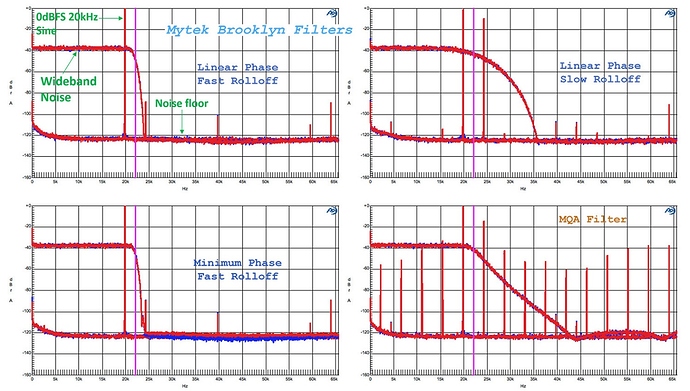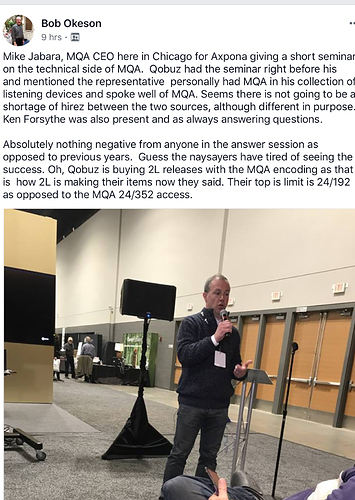yes, i have.
This is only applied for sampling 44.1/48kHz. If you move to 88.2/96k or higher, the type of filters used are more relaxed. The sweet spot is to sample at 192kHz; you can apply minimum phase filter at 60kHz and roll-off at a rate of -20dB for every 10kHz until it hit at 96kHz. At 96kHz, you get more than -60dB attenuation, more than enough to stop any aliasing 
Agreed. Original High resolution recordings (physically recorded at 96KHz or higher) can be anti-aliased well outside the audible range with a relaxed less aggressive filter. This is leaky but inaudible provided the DAC and amplifier do not suffer from IMD. (Unfortunately a common issue)
The way I understood MQA is that it is stored at 44.1 KHz (compatible to a CD player) and then unfolded roughly twice to 192 KHz. So the approach relies on upsampling.
Upsampling creates reflected ghost images in the adjacent audio band. So 44.1 KHz upsampled to 96KHz will have a ghost image from 22.1 KHZ to 48 KHz. If upsampled directly to 192 then there will ghost images from 22.1 up to 96KHz. Because of this scientific and mathematical certainty of ghosts the upsampling process requires a sharp filter at 22.1 KHz. This sharp filter ensures that a ton of distortion isn’t created above 22.1 KHz and below the new Nyquist of the higher sample rate.
From what should be obvious to anyone, MQA process is fraught with distortion from their poorly designed filters.
44.1 & 48 stay in the same source rate family when unfolded and then upsampled by MQA software and/or hardware.
Same would apply with the original downsampling MQA does before folding.
So you can explain about the hundreds of AD conversations then? Or is it just anti MQA mantra?
Exactly, all MQA files always exist in 44.1/48kHz in a unfold state. If you compare between minimum phase vs MQA filter, you can see, MQA has a much slower roll-off, this type of filter is extremely leaky; it only get fully attenuated at 44.1/48kHz (MQA core output sample at 88.2/96kHz)!

Just imagine if you do sampling at 44.1/48kHz to a MQA filter, it is as good without using any filter!
Speak with a sound engineer or go to studio and watch a recording session.
And please stop bashing me for not accepting the claims about mqa.
Dude, MQA encoding is done only at the final stereo mix down, i.e. The copy is used for final distribution as lossless Hi-Res downloads and streaming (Qobuz Hi-Res). This copy is then sent to MQA Ltd for in-house encoding.
Just to be clear, MQA processing is NOT done during the A/D conversion nor during the recording session. The recording studios do not have any access to MQA hardware whatsoever. By the way any MQA processing done before mixing console will simply destroy the code integrity and cannot be decoded in the end.
So your assumption of compensating A/D deficiencies in the beginning is really questionable. From multi-track recorders with multi A/D converters to mixing consoles doing DSP such as EQing, editing and bump up some gain to create some loudness then do a final mix down to stereo copies. This is then sent to MQA Ltd for encoding. Do you think after so many processes involved, they can still compensate every A/D converters used before hand?
Do not get fooled by those dubious claims, do some research and ask yourself if this is really a possibility.
MQA isn’t involved at all in the recording stage. It is not involved in any of the recording process(es) that may be used in producing a digital master.
MQA is involved in the process of producing distribution digital files from a digital master, used to distribute for public consumption. It can also be used to ‘treat’/process a digital master, prior to distribution of the MQA’d files for public consumption.
To reiterate: MQA has nothing at all to do with the recording process itself, which is generally to PCM/DXD.
MQA only becomes ‘involved’ post-master production.
2L recordings are indeed distributed via Qobuz as MQA. It would seem that’s the only format they’re using to distribute their music via streaming services.
Let’s hope they’re the exception, rather than the ‘rule’…
Unfortunately, people who use Qobuz app to playback 2L catalogue find themselves playing back at 44.1kHz instead of 88.2kHz from Tidal app. This is really silly of Qobuz to buy from 2L and not providing MQA software decoding in their apps? Don’t trust these people until Qobuz makes an official statement regarding on this.
Unless the have an MQA DAC
MQA has absolutely nothing to do with AD conversion. It’s about DSPing the end product of AD conversion and then further filtering in the DA process. They make dubious claims that they can fix the problems of individual AD converters. Yet they ignore to discuss how they do that on mastered multi-track recording that can have a mixture of AD converters and sometimes digital sampling.
MQA is to do with correcting AD inaccuracies in the AD conversion originally used. It is supposed to correct the conversion depending on what machine was used. So it has “nothing at all” to do with the recording but “everything to do with” correcting it subsequently. At least that’s my understanding of the theory.
Unfortunately I don’t have an MQA DAC so I’m stuck with 44.1k with Qobuz app or 88.2k with Roon. 352k is still an impossible feat.
It’s to do with correcting it, depending on how the AD was done, how is that nothing to do with it? That’s my understanding of the theory.
In THEORY you are right, but doing something like this is, well THEORY.
Each mike feed goes through A/D conversion, each mike feed would have it’s own correction characteristics. Correcting this even for one recording for which the exact recording topology would be know, is in practice impossible. For a minimal miked recording with two mikes I could just about imagine it might be possible, if the individual mike feeds are accessible. Multi miked recordings, no way,as the errors are superimposed. Now imagine the effort needed to do it for each recording that is issued in MQA format. How one would go about that, eludes me.
Who says a 24/192, 24/96, DSD or DXD recording needs ‘correcting’?
Oh, yes. MQA do…
Well, more often-than-not, they sound just fine to me just as they are!
That’s because they don’t. It’s impossible.
